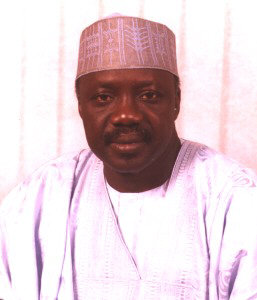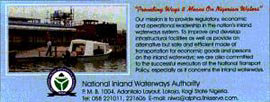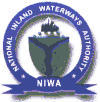
|



|

 NATIONAL
INLAND WATERWAYS AUTHORITY NATIONAL
INLAND WATERWAYS AUTHORITY
"Providing Ways & Means on Nigerian Waterways"
Manager:
Mr. R.D.Abubakar, Engineer
Interview.
Contact:
Adankolo
P. M. B. 1004
Lokoja
Kogi State
Telephone +234 58 221011
Email niwa@alpha.linkserve.com |
 Strategy Strategy
 The NIWA Mission The NIWA Mission
Is to provide regulatory, economic and operational leadership in the nation’s inland waterway system. To improve and develop infrastructural facilities as well as provide an alternative but safe and efficient mode of importation for economic goods and persons on the inland waterways; we are also committed to the successful execution of the National Transport Policy, especially as it concerns the inland waterways.
"Our other concerns is the level of pollution of the waterways. We have the role of checking and stopping pollution of the waters. We have the role also to clean it. We have to do all these things. By this achievement of getting much of these three areas of my focus, we will be able to have something and look at the solutions. And if we are able to have anything on that, then the riverine areas will obviously improve."
Alhaji Diori Abubakar - NIWA Managing Director
 What does NIWA do? What does NIWA do?
As stipulated in Decree No. 13 of 1997, NIWA is also capable of providing the following services:
Regulatory Services
We issue licences for inland navigation, piers, jetties and dockyards; examine and survey inland water craft and shipyard operators, grant permit and licenses for sand dredging, pipeline construction, dredging of slot and approve designs and construction of inland river crafts.
Transport Services
NIWA is equipped with a number of vessels, enabling us to operate ferry services (for economic goods and passengers) and run cruise boats (for tourism ad leisure)
Engineering
Our wide range of engineering services include boat construction, repairs and dockyard services, construction of inland river ports and jetties; we provide hydraulic structures for river dams, bed and banks stabilisation, barrages and groynes; install and maintain lights, buoys and all navigational aids along all water channels and banks.
The Environment
We pursue an ecologically sound inland water transportation policy. Due consideration is given to the well being of aquatic life as well as the clearing of water hyacinth and other harmful aquatic weeds. We are also authorised to "carry out environmental impact assessment of navigation and other dredging activities within the inland water and its right-of-ways." We are ever determined to work in harmony with nature.
Marine
As part of our marine services, we remove and receive derelicts, wrecks and other obstructions from inland waterways and undertake capital and maintenance dredging.
Survey
Hydrological surveys, river chart production and cartography, river mapping, aerial survey and underwater survey.
General Services
We collect river tolls, acquire, lease and hire properties; produce, publish and broadcast navigational materials such as notices, hydrological year books, river charts and river maps; carry out consultation and contractual services. We represent the Government of Nigeria at national and international commissions that deal with navigation and inland water transportation and also advise Government on all borders matters that relate to the inland waters.
 INTERVIEW WITH INTERVIEW WITH
ENGINEER R.D. ABUBAKAR,
MANAGING DIRECTOR, NATIONAL INLAND WATERWAYS AUTHORITY (NIWA) (NIGERIA).
FORBES: Nigeria has over 3,000 Kilometers of waterways, among the longest in the world. These have been going into the seas for several years now. Could you give us a short historical background of the waterways up to this point?
ABUBAKAR: I will talk about the history of NIWA as an organisation, then I will talk about the history of inland waterways. The organisation was set up in
1956 purposely to regulate the activities of the inland waterways in Nigeria. It has a chequered history. The organisation has been in existence since the Colonial era up to
1967 when the Nigerian Civil War started. As at that time, government did not show enough interest in the activities of the nation’s inland waterways. Although that period saw the maximum utilization of inland water transportation in Nigeria. It was a period where the economic activities especially with communities on the riverine areas got a lot of boost. Agriculture as an industry was doing well. In fact there was a boom in that sub-sector and one wonders why the situation has changed for the worse. Studies have shown that the difference between (1956-1967) and 1967 to date affected the development of Agriculture especially as it relates to water transportation. It led to a situation where agricultural produce from one section of the country cannot be easily transported to another section of the country, this situation discourages production especially among the farmers. This is a good illustration of the fall out of the neglect of the waterways by both the government and operators of the sector. It has a serious consequence on our socio
-economic activity, on agricultural development in the country and even on the products that goes out for export from our port in the south.
FORBES: Because of all these years of neglect, what are those problems that you’re facing now and wouldn’t you restructure the inland waterways?
ABUBAKAR: Well, the government has realized the need for an accelerated development of the economy generally and the inflationary trend is making government to look into areas that will help bring the economy back on track. Government also is of the opinion that a virile water transport system will enhance agricultural productivity. Government is also interested in developing the Niger Delta areas since a virile water transportation system in that area will enhance both economic and agricultural activities and generate employment opportunities for the Niger Delta people. That must have informed the decision of government in establishing an autonomous Authority like (NIWA) from what used to be known as inland waterways department under the Federal Ministry of Transport. The expectation is that an autonomous body will be able to respond faster to the needs of the riverine communities and provide the necessary infrastructure that will enhance the growth of inland water transport in the country within the shortest possible time.
FORBES: What kind of development are you talking about?
ABUBAKAR: Well, the first aspect is to make sure our inland waterways become navigable and that is why the first investment government is making is in the area of dredging the waterways. This will enhance the options of moving persons, goods and services. Government is also making efforts to repair some of our vessels and put them back into use. Government is also looking into the area of manpower development, for instance the dredging project will give a lot opportunity for manpower training. These are some of the efforts government is making to make our waterways viable.
FORBES: The PTF (Petroleum Special Trust Fund) is funding N500 million, I think towards some vessels and dredging, I’d like to know what other concrete ways of funding you have to finance the other projects.
ABUBAKAR: Well, both the repairs of the vessels and the dredging are being funded under the PTF programme. I think you might have come across some of the publications in the Newspapers, the PTF is putting in about N8.billion for the dredging work on River Niger and the Port Development Programme, and about N500 million for the repairs of the vessels, and other logistics that may be necessary in future.
|
FORBES: What other ways of funding do you have apart from that? Are you receiving any funds from the waterways which are being used at the moment and if so, how much?
ABUBAKAR: We are developing a revenue earning base for the Authority under the law establishing NIWA, all operators on the waterways are expected to make contributions in terms of regulated dues that are supposed to be paid to the Authority. These dues will help the Authority to provide services that will in turn be of benefit to the operators.
FORBES: Can you give us a projection of your expected revenue base for the next five years.
ABUBAKAR: I cannot come up with a projection when you consider that the period from 1967 – 1999, about 32 years of neglect, under this period navigation nearly almost stopped. It is not easy against this background to come up with a projection, because so many things are involved. We have to now go back again all over to create an awareness of both investors and the present users of our waterways. We expected that about 500,000 tons of cargo can be moved annually on our waterways if people get to start using the waterways again. I hope this will also encourage investors to start putting some funds into the inland waterways transport system. One can give a projection on the cargo movement but not on the exact numbers of the pattern. It involves a lot of things.
FORBES: But if it was operating at full capacity, how much would that be?.
ABUBAKAR: Believe me, it is not easy to come with a figure. I think it has taken most part of my years (General laughter) to really say this is what it is. In the fifties, I mean between 1956 – 1967 most of the importation into the country were carried out along the inland waterways, most of the foreign ship owners prefer to move their carges on our waterways instead of the road network.
FORBES: Why?
ABUBAKAR: There are so many advantages in moving cargoes on the inland waterways which is the safest of all means of transportation, and a large volume could be moved at once, cutting down (on) all logistics of moving the same volume of cargo, Take for example, to move 2,500 tons of cargo, you will need about 50 wagons by rail to do that, and you will need 250 trucks to move the same volume of cargo by road. You only need one 250 tonne barge to move the same cargo. You can move about 8 of these barges with a tug boat. One single Tug boat can move 8 barges at the same time. You can imagine the logistics of trying to get 250 trucks multiplied by 8. The only disadvantage is time.
FORBES: Time, Yeah, right.
ABUBAKAR: Yeah, it is slower. But in terms of volume and cost, it is the cheapest mode of transportation. In fact, you pay one quarter of what you ought to pay if you decide to move it by road. The feeling of government and our feeling is that if you can reduce the cost of transportation, you can effectively reduce the cost of goods or commodities in the country.
FORBES: The government is implementing its privatization programme at the moment. You were talking earlier on about investment within the inland waterways and private sector investment.
ABUBAKAR: There are a lot of things that we look at when we talk about privatization. There are functions which may be difficult areas for a private investor to cope, some of such aspects are left for government to carry out. There are also other aspects that it is best left with the private sector. Like the movement of goods and services, government has no role in moving goods and services, this is strictly a private sector operation. Providing barges to move cargo and ferry services to move passengers. These are all private sector activities. But because of the neglect that inland waterways transport sector has faced, which has discouraged many private operators from operating, government has no choice but to step in. you cannot take a risk of putting your barge on a channel that is not navigable and unpredictable. Safety is very important.
FORBES: So you are setting up a frame work right now and
…?
ABUBAKAR: Yes, that is what we are trying to do. Identify areas which are basically private – sector areas, and then hand them over to private sector to operate. We are still looking at it in two ways, there are areas where we could start operating in joint venture with the private sector. Let us say I have about 40 ferries in operation with the Authority, but I don’t want to operate them, so I can get a private operator to now operate the ferries on an agreed sum and term. We can also go into other joint venture areas. Our role is to divest from areas that are strictly private sector operations. What we have to do is just maintain the waterways, take charge of the safety control on our waterways and ensure that our waterways are navigable. These are roles that may not interest the private sector operators, but nevertheless are statutory obligations of the government. We still have to play that role to make the waterways safe.
FORBES: On a personal note, where do you see NIWA in 5 years time? Do you see a bright future for it. Or……?
ABUBAKAR: At the pace we are moving, and from the indicators we have, there is a big future for NIWA. NIWA is not the only operator, there are so many other operators on the nation’s inland waterways. And the elevating intervention of the Federal government in trying to provide adequate infrastructures for safe navigation on the inland waterways, the future is very bright. We also hope that the tourism aspect of the inland waterways will be exploited by private investors. The private sector can do a lot to develop our tourism potentials with our waterways.
FORBES: You were talking about ventures, can you start right now with the private investors (with whom) to go into joint ventures, have you been looking for some people already?
ABUBAKAR: Yes of course we have. They are now looking for us.
FORBES: That’s the way it should be, then?
ABUBAKAR: No, it shouldn’t be that way, but I am just telling you the anxiety that is being generated, so that when we open up to say, look, come on, we are ready to open to join up with you. The general response has been impressive. And in fact, next week, I will be having a workshop with the river users, it is a discussion forum with river users in the country, in Port - Harcourt, River State.
FORBES: This is, you …….
ABUBAKAR: This is part of the enlightenment campaign we are trying to put across, to get the river users to know what is going on, the potential benefits they could derive, their problems and what we can do to assist in solving the problems. We can only make progress when we discuss with the river users and we can resolve to work together.
FORBES: So, they are national investors?
ABUBAKAR: They are.
FORBES: You haven’t been looking for some investors abroad in terms of strength of technology.
ABUBAKAR: No, so far with the present situation , we have not made that headway. Again since there is no hidden issue, the waterways are opened up and are safe for navigation. In fact, the private sector itself is working with the some foreign investors that are already in the country. And the mere fact that the foreign investors within the country are aware that there is an opportunity for them, they would also send signals outside that there is a bigger opportunity for investment on the nation’s waterways. At the initial stage we are trying to take up the response within the country, before we start to look for investors outside, if you start to talk to investors outside, he will ask you what do you have? That is why we are trying to see that at least the dredging work is in place, and then the channels are safe to navigate, then we can now start talking to our foreign investors. In fact our private sector will start talking to them first before us, that is our expectation.
FORBES: Thank you very much, thank you very much. |
© World INvestment NEws, 1999.
This is the electronic edition of the special country report on Nigeria published in FORBES Magazine,
May 31 st issue.
Developed by AgenciaE.Tv |
|
|
|
|
|
|
|
|
|
|
|

